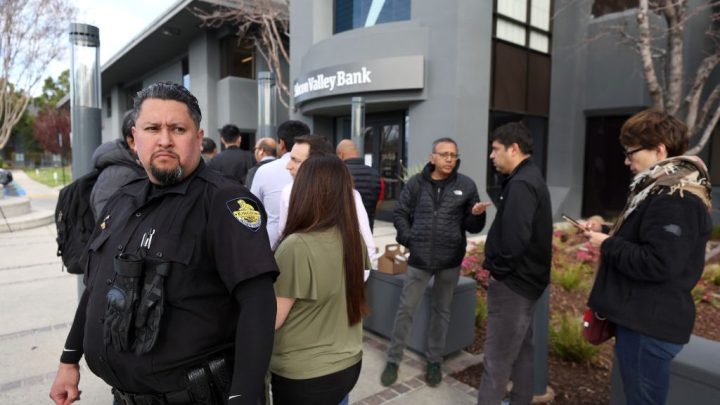
Banks will pay the cost of SVB’s collapse, and maybe that’s “how it should be”
Banks will pay the cost of SVB’s collapse, and maybe that’s “how it should be”

It was tough news for the banking industry this weekend.
Government regulators shuttered both Silicon Valley Bank in California and Signature Bank in New York City after both banks collapsed due to runs on Friday. Then on Sunday, the Federal government also agreed to backstop all depositors affected by the collapse.
“The fact that depositors are made whole, that cost is going to be borne by the banking industry,” said Laurie Stewart, president and CEO of Sound Community Bank in Seattle. “And that’s how it works and that’s how it should be.”
Stewart spoke to “Marketplace” host Kai Ryssdal about how the troubles are affecting her bank. The following is a transcript of their conversation.
Kai Ryssdal: Let’s talk about Friday, and you get the news that SVB has been shut down. What were your first thoughts?
Laurie Stewart: Well, the first thought is, you know, your stomach just kind of falls. No matter how it turned out, I have huge empathy for those clients and those bankers trying to work through a tough situation. But then, of course, I thought about, “What does it mean in our market? And what does it mean to the industry? And how do I watch out for our clients?”
Ryssdal: What are you hearing from your clients?
Stewart: Well you know Kai, I get up every morning and I’m kind of the nervous, anxious type. Not totally, but a little bit nervous and anxious. And I get up every morning and I say, “What I get paid for is to take care of other people’s money, and so how can I be sensitive to that?” I tried to be totally available to clients. Some I talked to over the weekend. And that’s been a good news story, actually. I’ve talked to more people who wanted to bring us money than take money.
Ryssdal: What, then, the rest of the week are you going to be thinking about?
Stewart: So I’m going to continue to watch the horizon, see how people are reacting — especially see how small businesses [are] reacting. You know, we have wonderful opportunities to help you and I —consumers — get a lot of additional FDIC insurance by ownership and that type of thing. It’s a little tough for businesses. They pretty much can’t structure their transactions like that. Businesses, they’re anxious because they have people depending on them too. So I’ve actually talked to more small businesses than consumers.
Ryssdal: What what do you make of the — I’m not going to call it a bailout, because that’s a tough phrase right now — but what do you make of the depositors in Silicon Valley Bank being made whole?
Stewart: Well, I tell you, I’m really happy for them. But here’s the thing: We’re gonna pay for it. Banks are going to pay for it. Folks need to remember it’s an insurance fund. And so if the insurance fund, just like if it’s a hurricane and you have a big loss, that means the people still buying insurance, which are the other banks that are surviving, are going to pay higher premiums. So you’re right, that bailout word is really emotional and has a lot of negative connotations. The fact that depositors are made whole, that cost is going to be borne by the industry. And that’s how it works and that’s how it should be.
Ryssdal: So you think the system is working?
Stewart: Oh my goodness, I think that, you know, if I were queen for a day, I would certainly think about how the FDIC insurance is structured a little bit. I’d like to find some more options for business clients to increase their coverage. But in terms of the fact that banks are paying the premium, I think that part works great. And we have the full faith and credit of the United States government behind this, but we didn’t have to go get that money in the last big crisis.
Ryssdal: Right. Right. Are you frustrated, I guess, Laurie, that SVB made some bad calculations on its interest rate risk, and now you and lots of other smaller regional banks … yeah, I hear you chuckling, right?
Stewart: Yeah. I mean, you know, they could have made 99 great decisions and one that wasn’t such a great decision, so I don’t want to throw anybody under the bus. But yeah, I don’t want to pay those premiums because what does it mean? It means I can pay less on deposits or charge more loans. It’s not found money, right, it’s part of the business proposition.
Ryssdal: Yeah. Just as a last thought, you’re not seeing panic? You’re not seeing crisis? You’re not seeing people line up outside the door?
Stewart: Nobody outside the door, had no calls on this topic on a Saturday. [We] monitored the phones carefully. Had one customer at one branch [who] wanted to make a withdrawal because they were worried.
Ryssdal: Well. Good.
Stewart: Which makes me sleep better.
There’s a lot happening in the world. Through it all, Marketplace is here for you.
You rely on Marketplace to break down the world’s events and tell you how it affects you in a fact-based, approachable way. We rely on your financial support to keep making that possible.
Your donation today powers the independent journalism that you rely on. For just $5/month, you can help sustain Marketplace so we can keep reporting on the things that matter to you.


















